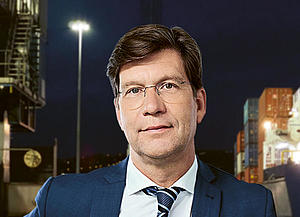The eternal power of the global differential
Christoph Schwennicke has been an influential journalist for more than 25 years, among others for “Süddeutsche Zeitung”, “Spiegel” and as editor-in-chief of the political magazine “Cicero”. He also has his very own opinion on the subject of globalisation.

Globalisation starts with small things, such as nutmeg on a tiny island. The smallest of the Banda Islands in eastern Indonesia is called Run and is barely half a mile wide, two miles long and does not have a single freshwater source. On this island, the nutmeg tree thrived, and continues to thrive, like nowhere else on Earth. The seeds were unbelievably cheap at the start of the 19th century: ten pounds of the finest spice cost just one halfpenny. In Europe, the same quantity could be sold for more than one pound and 60 pennies – an increase in value of 32,000 per cent. Incredibly lucrative trades such as this, often secured by monopolies, are what made the East India Company so wealthy. And it was these incredible riches that enabled the British to build their global empire, which lasted for around 100 years.There are countless definitions of globalisation. One states that it is “the process of increasing intermeshing and interdependence of economies, societies and cultures around the world, driven by progress in technology, transportation and communication”. This is what ChatGPT, the artificial intelligence chatbot, produces when asked what this phenomenon is all about.
What defines globalisation?
But it can be summarised even more succinctly: globalisation is a differential. It becomes powerful when there is a profitable difference between the cost of raw materials, products and services on one side of the world and their value on the other side. The kinetic energy released by this differential increases the wider the gap becomes between the costs here and the profits there.
The Normans used this power to make it from Scandinavia all the way to Sicily. The Hanseatic League of the 12th century also covered half of Europe, as did the Swabian House of Fugger, whose wealth was drawn from the power of globalisation from the 14th century onwards. The Silk Road leading to China for many thousands of kilometres is also an early example of globalisation. As a result, the emerging global power wants to establish a new version, this time covering an even bigger area than it did 700 years ago.
Merchants had to go to great lengths in the olden days. They had to travel a long way and the vehicles available were not as highly developed as they are today. But they were happy to accept the hazards and difficulties for the potential profit they would gain. Two innovations accelerated this trend: new digital transport routes and the evolution of container ships into floating towers of cargo. Not only have these giants of the ocean continued to grow in size over recent years but also in number: 5,442 of them were afloat on the world’s oceans in 2021. Size alone is not a characteristic of globalisation, however. In 2022, Switzerland (which does not have access to the sea, but has one of the world's largest shipping companies in MSC) overtook the Netherlands as the most globalised country in the world. In the ranking by ETH Zurich university, which evaluates economic, social and political globalisation, the Swiss achieved 91 index points.
Crises cannot stop the trend
Pandemics and wars can put the brakes on the general trend for a while, however. The vulnerability of supply chains is then thrown into sharp relief and some just-in-time production is put into question. During the three years of the coronavirus pandemic, warehouses, which had previously been seen as antiquated, were built in larger numbers than they had been for a long time.
However, the trade barriers and sanctions associated with such crises will only ever be able to put the brakes on globalisation for a certain amount of time before returning with a vengeance afterwards. The assumption was that digital video conferences would reduce air traffic permanently. But to a large degree it has already returned to pre-pandemic levels. And the virtual world of Meta, previously known as Facebook, will not stop people from wanting to fly to real sunny shores.
“Rock and roll ain’t noise pollution” goes the AC/DC song about the most globalised music in the world. And it will never die. The same is true of globalisation. Anyone thinking the trend will wane again, perhaps to be replaced by a new era of trade protectionism, might just as well believe that gravity will one day run out.